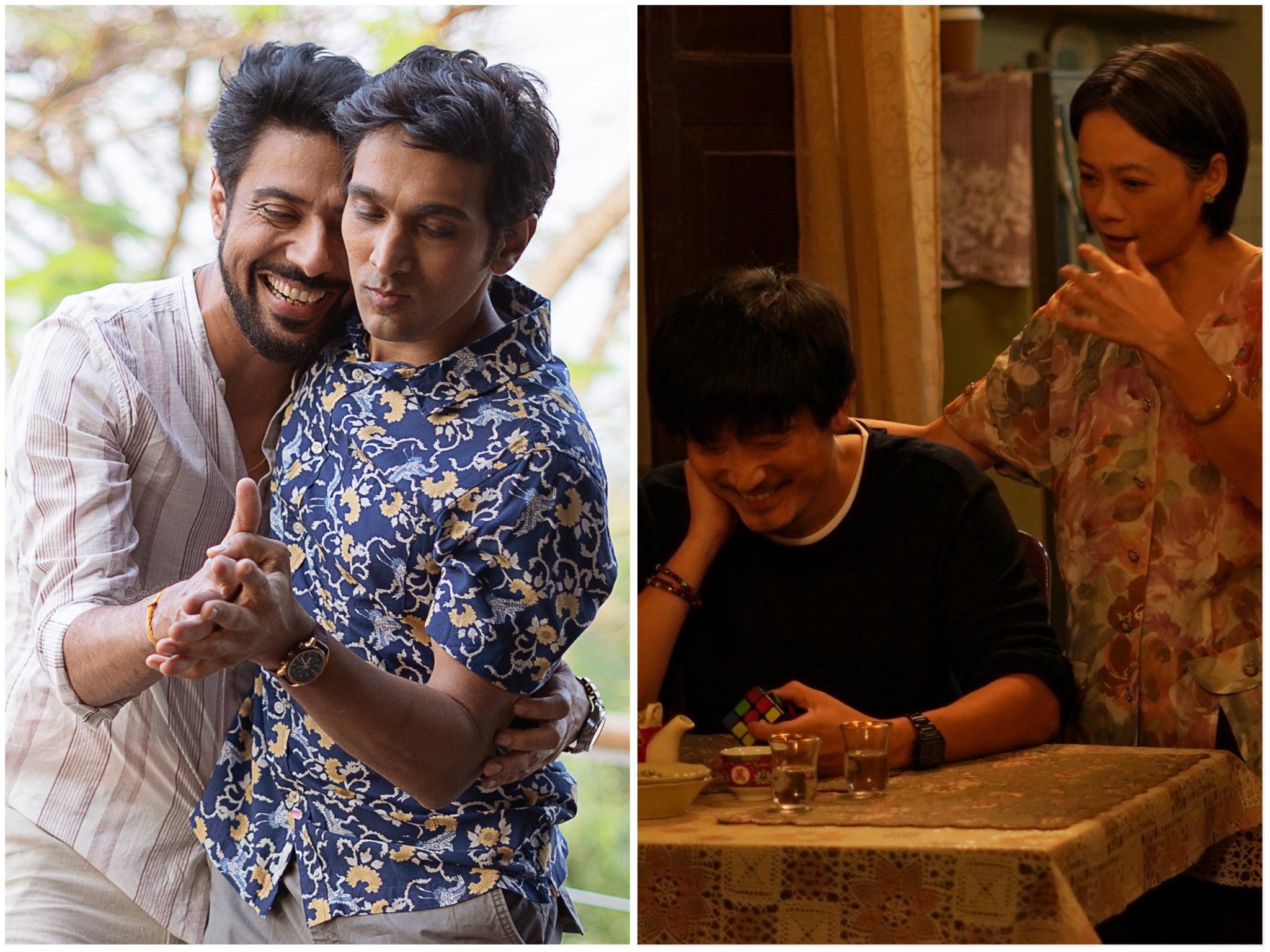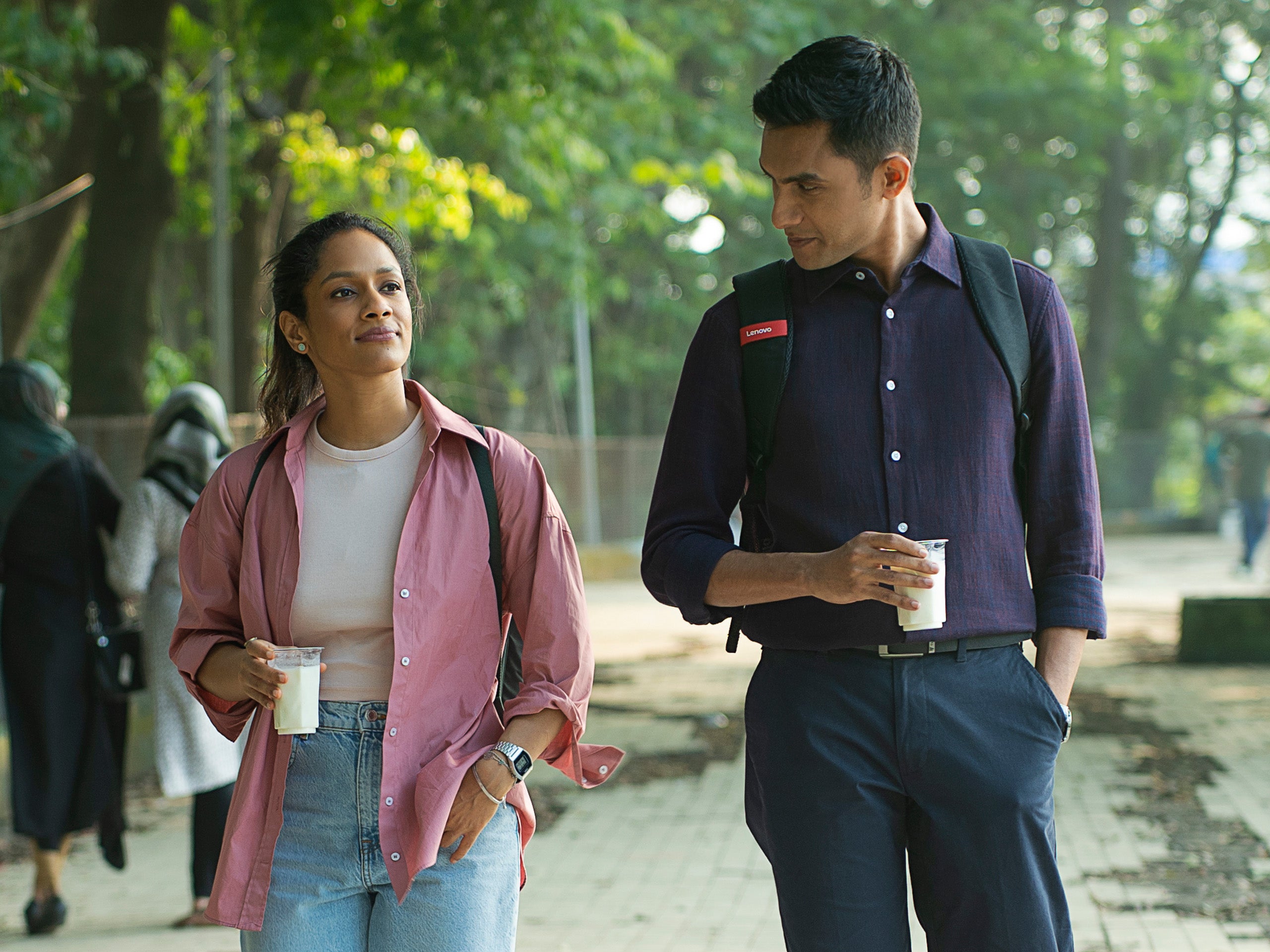Modern Love Mumbai is a love letter to the everydayness of romance
The makers of India’s debut ‘Modern Love’ season talk to Maanya Sachdeva about adapting the hit US TV show and crafting fresh tales for the diverse characters inhabiting Mumbai


Your support helps us to tell the story
From reproductive rights to climate change to Big Tech, The Independent is on the ground when the story is developing. Whether it's investigating the financials of Elon Musk's pro-Trump PAC or producing our latest documentary, 'The A Word', which shines a light on the American women fighting for reproductive rights, we know how important it is to parse out the facts from the messaging.
At such a critical moment in US history, we need reporters on the ground. Your donation allows us to keep sending journalists to speak to both sides of the story.
The Independent is trusted by Americans across the entire political spectrum. And unlike many other quality news outlets, we choose not to lock Americans out of our reporting and analysis with paywalls. We believe quality journalism should be available to everyone, paid for by those who can afford it.
Your support makes all the difference.Based on the eponymously titled column of essays in The New York Times, the Modern Love franchise and anthology series has travelled from the United States to India, where six exciting filmmakers – including critically acclaimed Bollywood directors Vishal Bhardwaj, Shonali Bose, and Hansal Mehta – have brought it to scintillating life.
The result is six diverse stories of love in different forms, from romance to self-love, all set in the indomitable city of Mumbai. There’s Bhardwaj’s tale of a caretaker in the city’s only Chinese temple, Mehta’s stirring same-sex short which explores religious identity, and Dhruv Sehgal’s quiet love story about a landscape designer (Masaba Gupta) and the unassuming government employee (Ritwik Bhowmik) who catches her by surprise.
“I was trying to capture the daily-ness of suburban life, that you go to work and you go to a park, then you go home, you come back to work. You have conversations which are everyday, but which mean something,” Sehgal tells me of his episode, “I Love Thane”. “I wanted [Mumbai’s unique spaces to] seem everyday, and lived in.”
In the same way, he wanted its protagonist Sahiba to be free and emancipated, but “without having to say ‘Hey, look, it’s a modern, liberated woman.’” Enter Masaba Gupta, well-known Indian fashion designer and star of Netflix’s biographical drama Masaba Masaba, who tells me she was cast because of a sense of “everydayness” that she brought to the role. Her character, she adds, is relaxed and free: a girl next door with a mind of her own.
On closer inspection, all six short films poignantly capture this gentle ordinariness. If Sehgal’s episode is elevated by a vanity-free handling of its subject – Gupta plucks her chin hair and wears non-sexy workwear on dates – Mehta’s short benefits from its thoughtfulness.
“Baai” is inspired by a Modern Love column entitled, “The House Where My Husband Doesn’t Exist”, about the author struggling to tell his dying Palestine-born, LA-based grandmother about his husband. In Mehta’s sensitive retelling, the protagonist is Manzu (Pratik Gandhi), a gay musician born into a conservative Muslim household, who is torn between the love for his partner, flamboyant chef Rajveer (played by real-life chef Ranveer Brar), and ailing grandmother, or “baai”, played by veteran Bollywood actor Tanuja.

Director Mehta says he wanted the couple’s romance to be “very conventional. It’s just that you’ve flipped the gender”, adding that it’s a “queer story that’s dealt with as a love story”. With gay characters so often stereotyped by Bollywood, it makes for a refreshing and much needed take. “Hansal said just be in love,” explains Brar of his on-set direction. “‘Imagine whatever gender you can imagine, I just want to see love in your eyes.’ That was the only brief.”
Music was another crucial part of “Baai”. Songs like “Chandni Raat” (“Moonlit Night”) by singer Ali Sethi – whose 2022 Pakistani pop song “Pasoori” has struck a chord with listeners in neighbouring India – and “Kaisi Baatein Karte Ho”, by Bollywood playback singer Sonu Nigam, are interspersed throughout the episode.
I ask whether he was concerned about backlash towards a homosexual Muslim character, amid a climate of rising religious intolerance since prime minister Narendra Modi’s Hindu nationalist BJP came to power in 2014 in India. “The social fabric of our country has become so brittle, that I think it’s become important to tell more of these stories,” states Mehta. “To have characters from the communities that we, as a society, have continued to marginalise over the years.”

Watch Apple TV+ free for 7 days
New subscribers only. £8.99/mo. after free trial. Plan auto-renews until cancelled

Watch Apple TV+ free for 7 days
New subscribers only. £8.99/mo. after free trial. Plan auto-renews until cancelled
In this climate, “Baai” becomes a “stand-in for the larger, complex portrait of Bombay, which is a melting pot of very complicated emotions,” its screenwriter Ankur Pathak tells me.
“I think what ‘Baai’ also does is that it projects the prejudices of a younger generation on the older one, without actually giving them the benefit of deciding for themselves,” he continues. In the short, Manzu’s orthodox parents try and dissuade him from telling his grandmother about his husband, explaining that the shame of having a gay grandson might be too much for her to bear.
"My Beautiful Wrinkles" tackles a different, equally pervasive, age-related stigma, one “around the age difference in romantic relationships between men and women”, co-lead Danesh Razvi (A Suitable Boy) says.
In director Alankrita Shrivastava’s (of Lipstick Under My Burkha fame) short, Razvi plays Kunal, a young man in his twenties who fantasises about his 60-year-old neighbour Dilbar Sodhi (played by National Award-winning Bollywood actor Sarika). Dilbar, in turn, must reconcile her own sexual feelings for Kunal with the humiliation she experiences for experiencing them.
Ultimately, Dilbar and Kunal decide to preserve their fantasies about each other, without succumbing to them. When I ask Razvi if there’s enough conflict in this love story, he replies, with a smile, “I think love in itself is a conflict, don’t you?”

This theme of acceptance comes up once again when talking to director Bharadwaj, whose “Mumbai Dragon” chronicles Indo-Chinese mother Sui’s overbearing love for her son (Meiyang Chang), which is threatened when he begins dating a Maharashtrian woman – a girl outside of his own community.
Sui’s character (played brilliantly by Malaysian actor Yeo Yann Yann) is based on the real-life caretaker of Mumbai’s Kwan Tai Kwan temple – located in Mazgaon, Mumbai’s Chinatown. Finding the right actor to play the part of Sui was crucial. “Many people told me to cast someone from the northeast,” Bharadwaj says. “I told them I’m not going to cast someone from Assam and say that she’s Chinese. It’s against my sensibilities, It’s an insult to a race, It’s an insult to my intelligence.”
Bharadwaj says he was prepared to shelve the project if he didn’t find the right Sui, ultimately casting Yann via his friend, Pingyao Film Festival director Marco Mueller, who recommended her.
After the Covid-19 virus forced India into nationwide lockdown in March two years ago, many blamed China for the origin of the virus, criticising its lack of transparency over the crisis.
Then, in June 2020, violent clashes broke out between India and China along their 2,000-mile-long, poorly defined and long-disputed border in a remote area called the Galwan Valley. Amid rising tensions between the neighbouring countries, some members of India’s shrinking Indo-Chinese community told NPR they feared persecution “because of our yellow skin”.
When asked how he hopes audiences will receive the characters of his short against this backdrop, Bharadwaj is optimistic. “I think they should be able to see it beyond country or culture,” he says. “I wanted to subtly get the message across that we have to be open to other faith and people and, as a society, embrace everyone around us.
“There’s so much hate right now that I think a sentimental or emotional approach is the only way left for me [as a filmmaker] to reach people who are full of hatred,” Bharadwaj continues, speaking more generally now. “The only way is through tears.” Specifically those shed by the character of Sui.
After all, he adds, “every mother is like her – so lovely, so possessive, and so unreasonable.”
Episode six, director Asthana’s “Cutting Chai” is about a married woman Latika (Chitrangda Singh) who weighs her life choices against fading ambition on a serendipitous day at the Victoria Terminus railway station. “The storyline takes her through the journey of feeling regretful when she looks at her life to [the realisation] that her life is full of love,” says Singh, when I ask what drew her to the role. “Latika represents a lot of women and that’s the beauty of this script – it’s so relatable.”

It’s this relatability that makes the entire series so comforting. In its opening episode, “Raat Rani”, young Kashmiri cook Lalzari (Fatima Sana Sheikh) navigates her newly upended life in Mumbai on a rickety bicycle, after her husband Lutfi (Bhupendra Jadavat) leaves her suddenly. Based on journalist Elaisha Stokes’ Modern Love column “The Bike That Saved My Life” and directed by Shonali Bose, the film’s relatability is elevated to acceptance when you realise the three women involved in its story (Stokes, Bose and the character of Lalzari) have separately discovered the path to self-love is uphill but liberating.
There’s Stokes’ orginal story set in Manhattan, where she describes feeling overwhelmed by the dilapidated fixer-upper her ex-husband left her with, the character of Lalzari in Mumbai, alone and away from her native Kashmir, and Bose in California, where she found solace cycling around Santa Monica after the death of her son in 2010. All women of different ages with distinct pasts, religious identities, and origin stories, who have each reckoned with the daunting task of moving on from love. The result is a sense of deep one-ness with Lalzari and all the other protagonists of Modern Love: Mumbai; a place where love blooms in the city’s quiet corners and forgotten quarters, despite the chaos and daily hustle of its lovelorn, diverse inhabitants.
Modern Love: Mumbai is now available for streaming on Prime Video in the US, UK and India
Join our commenting forum
Join thought-provoking conversations, follow other Independent readers and see their replies
Comments